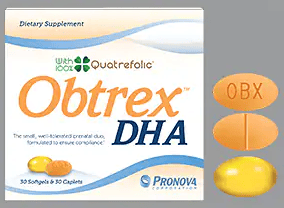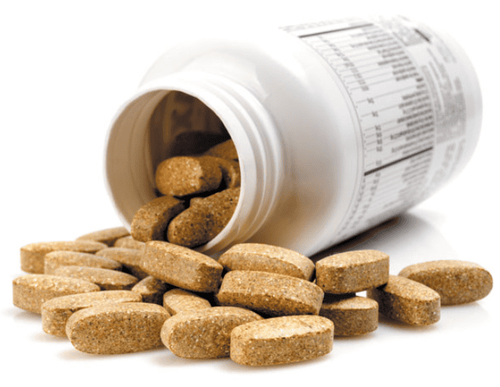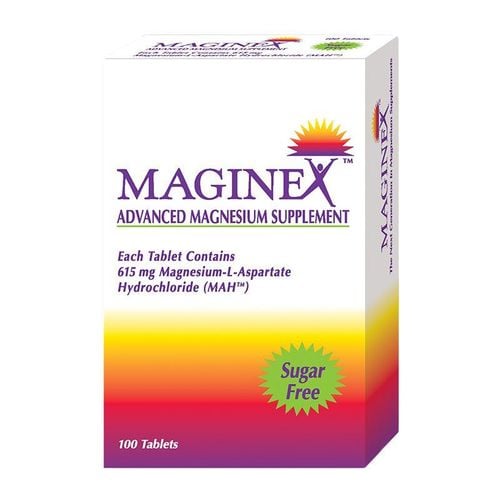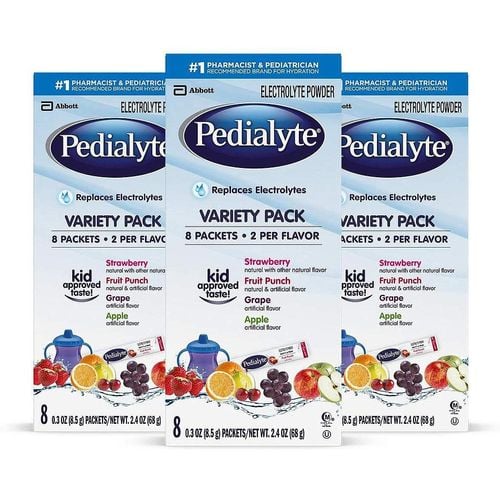This is an automatically translated article.
Juice seems to be considered a staple drink and is popular in many children's meals. Not only that, natural juice is one of the products that provide essential vitamins and minerals for children. So, the question is, is it really good for children to drink fruit? Choosing which juice will bring many health benefits to children? This article will provide detailed information for this content.
1. Benefits of juice
1.1. Great taste Fresh fruit is known for its great taste, so many children are satisfied when given fruit juice. Many children prefer juice over other drinks such as water or whole milk, because they prefer flavored drinks. This means it can be easier to encourage children to drink enough water, especially during the summer. However, the taste that children crave is often due to the high sugar content. Most fruit juices are very sweet because of their high natural sugar content.
1.2. Health Benefits Most fruit juices contain a variety of essential vitamins and minerals. The nutritional balance of the juice will depend on the fruit mix, as well as the processes used to get the juice ready for sale. Some of the preparation processes used in large-scale production, including pasteurization, can actually reduce the nutritional benefits of the ingredients used.
If you want your kids to drink fruit juice for the health benefits of fresh fruit, it's better to make your own fresh juice at home using a blender or food processor. However, well-prepared baby fruit juices contain many vitamins and minerals. For example, regular freshly squeezed orange juice will provide children with all the vitamin C they need for the day.
Fresh juices can make up one of your child's "five-a-day regimens", to help them reach their daily goals. You only need to let your child consume 150ml of juice per day for it to be considered part of their daily goal.
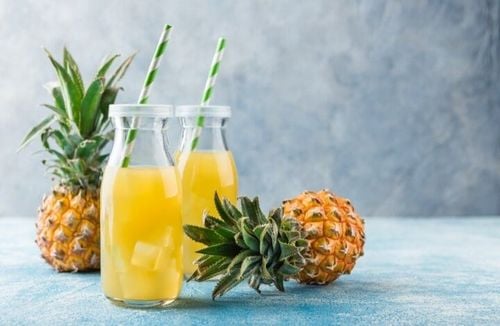
Nước trái cây chứa nhiều vitamin và khoáng chất
2. The risks of juices
Although, using fruit juice may bring some benefits for children, but besides it will also be risk factors for some bad effects for children such as:
2.1. Tooth decay The main risk from drinking too much juice is related to high sugar levels. Natural sugars found in fruit juices can cause tooth decay.
Most fruits contain high levels of fructose (fruit sugar) which is released when the fruit is ground or pressed. This sugar is not released in the same way when whole fruit is consumed. Since the juice flows around the mouth while drinking, the sugar can coat the teeth. The longer the sugar is in contact with the tooth surface, the more likely the sugar is to deepen the tooth surface. Eventually, tooth decay can form and can be very painful.
As well as affecting baby's baby teeth, too much sugar in juice can be bad for children's adult teeth when they start to come in. To reduce the harmful effects of sugar in natural fruit juices, you should only let children drink fruit juice with meals.
2.2. Calories in fruit juices Because of the higher sugar content in fruit juices, it is also possible that they are high in calories. If children consume more calories than they burn in daily activities, they are likely to gain weight.
Childhood obesity can increase the risk of ongoing health problems in later life. Because parents often feel like fruit juice is the healthier choice, they don't always consider the calorie content of these beverages. This can lead to consuming too many calories.
Although it is not recommended to teach children how to count calories, parents should be aware of foods and drinks that can be high in calories.
2.3. Misleading juice product labeling Manufacturers often use misleading labels when they market juice and similar products. They may use words and phrases that make the drink seem healthy.
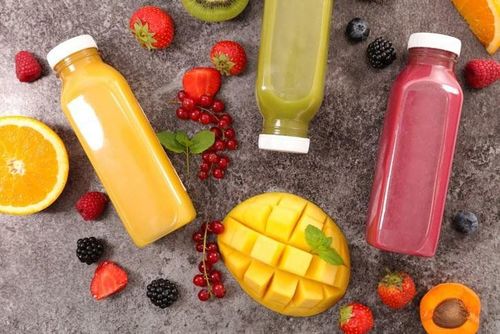
Lượng đường cao hơn trong nước ép trái cây có thể gây thừa calo
3. Should children drink juice?
Feeding children the right food and drink is very important, because the child's body needs the right nutrition to grow and develop. It can be difficult to find the right balance, especially when children are very young. A widely debated topic is whether fruit juice is really good for children? And what kind of juice is good for children.
Although some nutritionists have previously advocated fruit juices over carbonated drinks, more and more doctors are warning that juice consumption should also be limited.
There are still health benefits from fruit juices, but they should be enjoyed in moderation, not the drink of choice. Juice has less fiber and is less nutritious than whole fruit. It also tends to line higher.
For example, 1/2 cup of apple juice has no fiber and 13 grams of sugar. Compare that to 1/2 cup of sliced apples, which have 1/2 gram of fiber and 5.5 grams of sugar.
So better for your kids to eat fresh fruit and drink water instead. Children will get more nutrients and fiber and less sugar from fresh fruit products.
Too much juice can also cause diarrhea and tooth decay, and even contribute to obesity if kids drink juice instead of healthier foods.
But juice isn't bad: A small glass can be one way to get one of the four or five recommended daily servings of fruits and vegetables for kids. Just be sure to choose pasteurized products with 100% juice and avoid "juice drinks," which can be as little as 10% real juice. (The rest is sweetened and flavored.) The American Academy of Pediatrics recommends servings of juice based on age:
Under 12 months: No juice; Ages 1 to 3: No more than 114 ml (1/2 cup) per day; 4 to 6 years: No more than 170 ml (1/2 to 3/4 cup) a day; 7 years and older: No more than 228 ml (1 cup) per day.
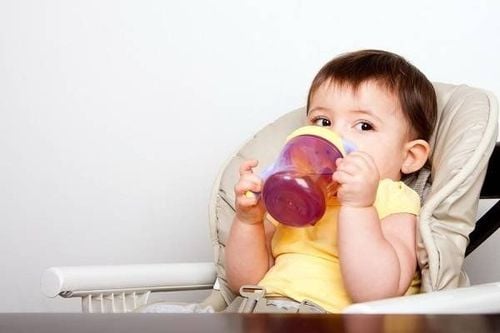
Trẻ nhỏ dùng nước trái cây cần lưu ý về độ tuổi theo từng giai đoạn
If you want to cut down on the amount of juice your child is drinking, here are a few ways to limit the amount of water your child receives:
Feed your child from a regular cup instead of a bottle, juice box or bottle. small cups that children can carry with them. That way, kids won't get into the habit of sipping juice all day. Dilute the child's juice with water. Start with half juice and half water (or carbonated water), gradually reducing the amount of juice over time. However, parents should also be aware of the problem: researchers at Consumer Reports have found that some juice products contain levels of potentially harmful heavy metals such as lead, inorganic arsenic and cadmium. Therefore, parents need to find out detailed information of the juices that are prepared for children to use.
For children to be healthy and develop well, it is necessary to have a nutritious diet in terms of quantity and quality balance. If children are not provided with adequate and balanced nutrients, it will lead to diseases of excess or lack of nutrients, which adversely affect the comprehensive development of children in terms of physical, mental and motor skills. Parents should supplement their children with supporting products containing lysine, essential micro-minerals and vitamins such as zinc, chromium, selenium, and B vitamins to help fully meet the nutritional needs of children. At the same time, these essential vitamins also support digestion, enhance nutrient absorption, help improve anorexia, and help children eat well.
Parents can learn more:
Signs of zinc deficiency in children
Micronutrient deficiency and failure to gain weight in children
Please regularly visit Vinmec.com website and update useful information to take care of your child. Take care of the baby and the whole family.
Reference source: babycenter.com




